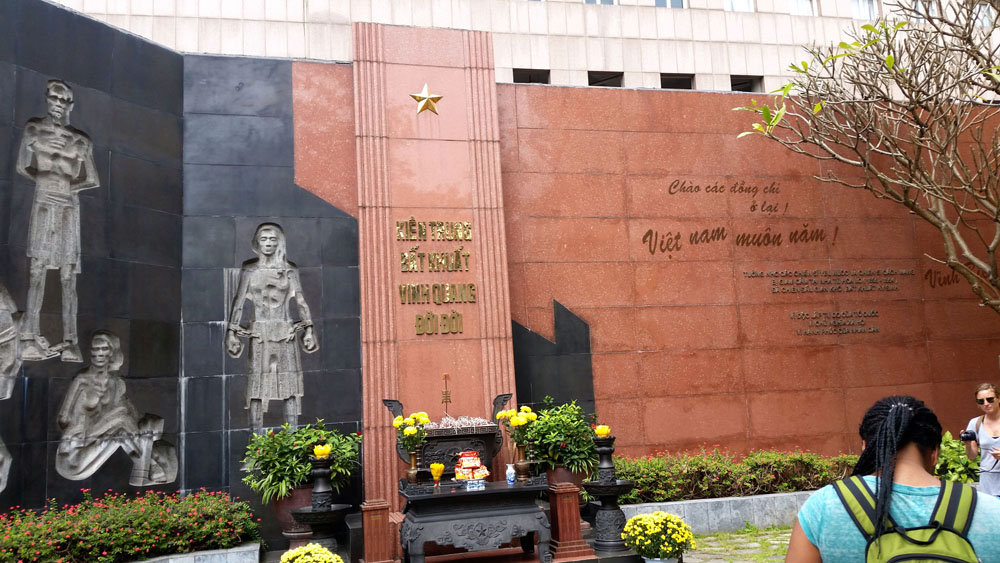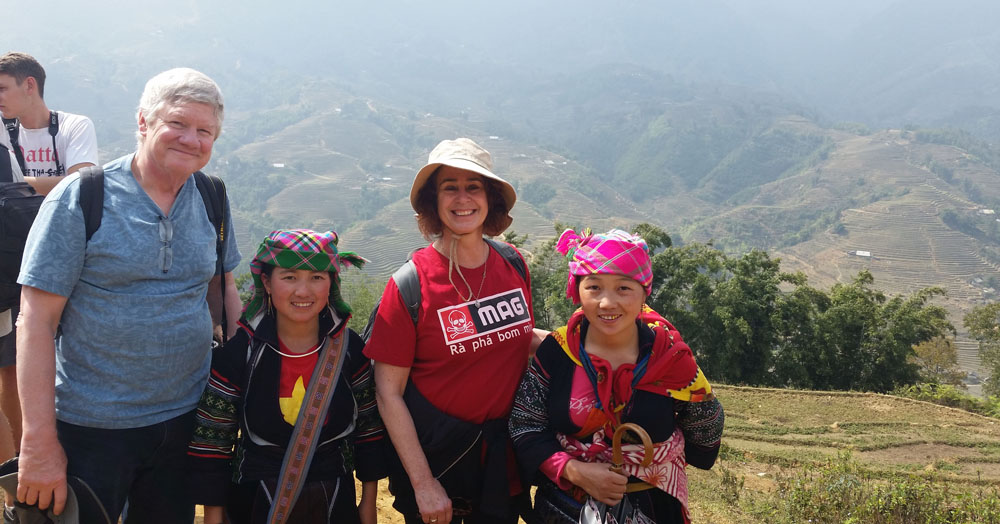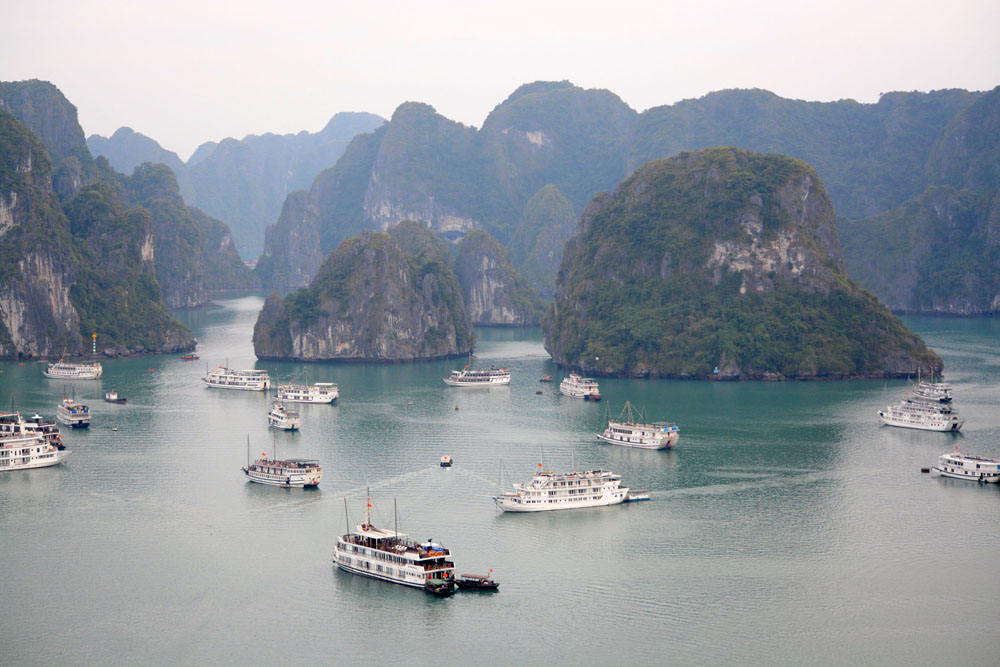 Download PDF of this full issue: v47n1.pdf (28.5 MB)
Download PDF of this full issue: v47n1.pdf (28.5 MB)From Vietnam Veterans Against the War, http://www.vvaw.org/veteran/article/?id=3396
 Download PDF of this full issue: v47n1.pdf (28.5 MB) Download PDF of this full issue: v47n1.pdf (28.5 MB) |
This past February I spent three weeks traveling throughout Vietnam with a brief stop in Cambodia to see Angkor Wat. I planned the trip with my new partner, an old anti-war activist who I met after my late husband, Bill Davis died in 2007. For Bill and I, the Vietnam War was not just history. As a National Coordinator of VVAW for over twenty years, Bill remained committed to helping veterans and fighting against this country's endless wars until he died. Until I retired from high school teaching in 2011, I taught a semester elective on the Vietnam War and the anti-war movement to high school seniors in a public high school near Chicago. So my trip to Vietnam was more than just a vacation.

|
| Memorial at Ha Long Prison in Hanoi. |
Going without Bill was difficult, although I'm not sure he would have wanted to return. Like so many vets he talked a lot about VVAW's work but was selective concerning what he shared about his time in Vietnam. I know there were stories he could never share and he never expressed a desire to return. Nevertheless I felt he was with me on this journey, making it at times bittersweet.
Touching down in Vietnam was intense. I'm finally here I thought. Our first stop was the Saigon Continental Hotel where many of the press stayed during the war. Although it showed signs of wear, it was worth staying there for the history it evoked. The city was booming, with construction and busy, bustling streets. Welcome to a land with virtually no regulations. Between the taxis, motor scooters and cars, just crossing the street was a harrowing experience. Someone told us that one thousand new motor scooters arrived in the city every day, although I cannot vouch for that number. However, the city is exploding and developing at record speed. Go now if you can, because in five years the pollution may rival China, Vietnam's biggest investor.
Part of the trip was experiencing the beauty and culture of Vietnam. Part was dealing with the painful history and present political landscape. We spent only two days in Saigon (now Ho Chi Minh City), including a side trip down the Mekong Delta, where rural poverty is still evident, and another to see the Cu Chi tunnels. Although the tunnels had been enlarged to allow tourists to experience a bit of life underground, all I could think of was how young and scared our soldiers must have been. The Vietnamese must have experienced the same fear, yet they fought on. As I walked around the area it was clear we could never have won the war.
The Remnants Museum in Ho Chi Minh City gave a chilling and fairly accurate account of the US's actions during the war with captured planes and tanks on display. A whole floor was devoted to Agent Orange, although the government's commitment to helping those affected is sadly deficient. As we moved north we found museums in Hue and Hanoi focusing on the war, both the French involvement as well as ours. In Hanoi we were disappointed with the Ho Chi Minh museum for its rather inaccessible historical coverage. However I would still recommend it as one of the most bizarre museums combining history and art that I have ever seen. One fifth of Ha Long Prison in Hanoi has been preserved and except for showing our prisoners having a great time playing volleyball, the depiction of the French is gruesome and well done. Of all the museums thank goodness I had a heads up from one of my former students — teaching English in Hanoi, small world — and went to the Women's Museum. I can't think of the equivalent here. It covered the women's role in the war as well as all the different customs of the many ethnic women in the country. It seemed to be the most honest, pointing out problems, especially for rural women.

|
|
Joan Davis and Dave Jacobs with directors Ngo Xuan Hien and Nguyen Thanh Phu at PROJECT RENEW. |
Perhaps the most inspiring was Project Renew, an NGO devoted to making Quang Tri Province safe from cluster munitions and other explosive remnants of the war. It is an organization I am confident after meeting with the director, that its staff of over one hundred brave people would put donations to good use. It is also close to the DMZ where I walked across the bridge that separated the country during the war. In Hue, the evidence of the brutal fighting during Tet is still evident in the Citadel and the Imperial City. In Sapa, near the Chinese border, we spent time trekking with amazing Hmong guides and spent a night in their village. They are still living without many needed services, but were amazingly warm and welcoming.
So what to make of this beautiful country today? We felt no anti-American feeling. The majority of Vietnamese were born after the war ended, to them it is ancient history. They just want to learn English so they can get a decent job and provide for their families. It is definitely not the socialist utopia I thought I was fighting for so many years ago. Public education and health care are not free for the vast majority of people. It is a developing country that is growing with what appears to be no clear plan. The people are better off than they were even fifteen years ago, but all development comes with a price. Little care seems to be placed on the environment. Capitalism is on steroids as the Chinese and Japanese pump money into many ventures. Huge high rises are being built on the outskirts of the cities, especially near Hanoi, for those leaving the poverty of the countryside. New hotels and tourist facilities are mushrooming.
The people are incredibly industrious. They are warm and very friendly. The food is great and the street food in Hanoi is something to experience — but you must be careful with the occasional scooter coming onto the sidewalk competing with the restaurants. It is a much more affordable place to visit than developed countries. Young back packers are everywhere, taking advantage of the cheap hostels, food, and transportation. But the Vietnamese are smart and prices will go up depending on demand. Although American tourists are in the minority, other foreign tourists are coming in droves.
For a people who have lived through so much war, one hopes their future will be filled with peace and prosperity. Some of the Vietnamese veterans of the war we met were disappointed with government corruption, the lack of human rights, and government censorship. On our last evening, three university students joined us on a bench in Hanoi overlooking the beautiful Hoan Kiem Lake, wanting to practice their English. They too were unhappy with their government and wanted more democratic rights. However, they loved their country and were optimistic that the future will improve. And in case you were wondering, most of the people we met thought Trump was an idiot!
Joan Davis is a VVAW member and widow of Bill Davis, former National Coordinator of VVAW. She is a retired high school history teacher, who taught history from the social justice perspective for twenty five years and now master gardener and part time travel agent for her family. If you have questions planning a trip to Vietnam feel free to contact her at vvaw@vvaw.org.

|
| Dave Jacobs and Joan Davis trekking with their Hmong guides in Sapa. |

|
| Ha Long Bay (where parts of the movies Indochine and Kong: Skull Island were filmed). |